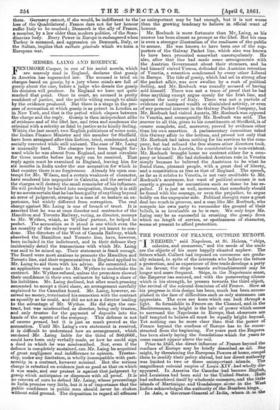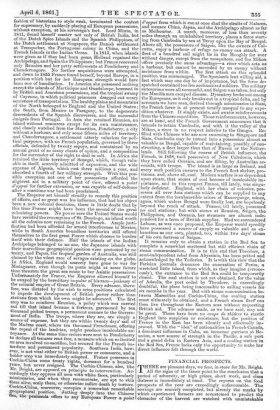THE POSITION OF FRANCE, OUTSIDE EUROPE.
"I' 'NEEDED," said Napoleon, at St. Helena, "ships, I. colonies, and- commerce," and the needs of the uncle are the objects of his more happily, situated nephew. The fetters which ,.Colbert. had imposed on commerce are gradu- ally relaxed, in spite of the interests who believe the fetters a protection, and as experience of free.trade develops a party in its favour,. the . steps towards enfranchisement -.may be longer and more frequent. Ships, in the Napoleonic sense, the Emperor-has secured, and with the persevering silence which is his strength, he presses towards the third object, the• revival of the colonial, dominion of old France. Slow as his progress inthis design has been, much has been accom- plished in the face of difficulties -such as only statesmen can appreciate. The eyes are keen,which can look througA a light. So formidable in France on the Channel, and in the Mediterranean, so bright is the halo of power which -seems to surround the Napoleons in Europe, that observers are half tempted to believe all must be equally bright beyond. Yet nothing can be more clear -than that the power of France beyond the confines of Europe has to be recon- structed from the beginning. For years past the Emperor. has been slowly laying the foundations which for years to come eannot appear above the soil. Prior -to 1855, the . direct influence of France beyond the confines of -Europe may be briefly described as nil. She might, by threatening the European Powers at home, compel them to modify -their policy abroad, but her direct authority was limited to two or three unimportant islands. The magnificent colonial empire of Louis XIV. had.wholly dis- appeared. In America the Canadas had become English, and Louisiana had been sold to the United States. Haiti had enfranchised itself by-wholesale massacre, and the little islands of Martinique and Guadeloupe alone in the West Indies acknowledged the authority of the Bourbon kings. In Asia, a Governor-General of India, whom it is the fashion of historians to style weak, terminated the contest for supremacy, by suddenly placing all European possessions, without exception, at his sovereign's feet. Lord Minto, in 1811, found himself master not only of British India, but of the Dutch Spice Islands and the Spanish Philippines, of the Dutch settlement at Singapore, the Danish -settlement at Tranquebar, the Portuguese colony in China, and the French Islands in the Indian Ocean. In 1815, when islands were given as if they had been gems, Holland regained the Archipelago, and Spain the Philippines ; but France recovered only Reunion and her petty -settlements at Pondicherry and Chandernagore. No further acquisitions were attempted, and down to 1855 France found herself, beyond Europe, in a position which but for her European strength would have been one of humiliation. In America she possessed nothing except the islands of Martinique and Guadaloupe, hemmed in by British and American possessions, and the tropical swamp of Cayenne, in which political prisoners dragged out weary sentences of transportation. The healthyplains and mountains of the North belonged-to England and the United States ; the South, from Mexico to Paraguay, to the degenerate descendants of the Spanish discoverers, and the successful emigres-from Portugal. In Asia she retained Reunion, an island without resources except for its own maintenance, and closely watched from the Mauritius, Pondicherry, a city without a harbour, and only some fifteen miles of territory, and Chandernagore, a settlement utterly valueless for poli- tical purposes, with no French population, governed by three officials, defended by twenty sepoys, and maintained by an annual grant of so many chests of opium, and a composition for the surrender-of -the right to deal in-salt. In Africa she retained the little territory of Senegal, which, though valu- able in itself, scarcely admitted of expansion, and the wide expanse of Algeria, which cost three millions a year, and absorbed a fourth of her military strength. With this pos- sible exception not one of her possessions afforded the slightest aid in a military point of view, offered a point d'appui for farther extension, or was capable of self-defence after a maritime war had been proclaimed. The Emperor set himself steadily to remedy this position of affairs; and so great was his influence, that had his object been a new colonial dominion, there is little doubt that by this time France might have been the second of the great colonizing powers. No power save the United States would have resisted theresumption of St. Domingo, an island worth all the colonies now remaining to the French. Ample justi- fication had been afforded for armed interference in Mexico, while in South America boundless territories still offered themselves to the first great Power which chooses to burden itself with their defence. Half the islands of the Indian Archipelago belonged to no one, the Japanese islands with their -marvellous geographical position were protected by no treaty, and Papua, the tropical garden of Australia, was still claimed by the vilest race of savages existing on the globe. In Africa, England would scarcely have gone to war for Madagascar, even though its ports might at some future time threaten the great sea route to her Asiatic possessions. Unfortunately for France, the Emperor allowed himself to be swayed by the hereditary impulse of his race—jealousy of the colonial empire of Great Britain. Every advance, there- fore, was dictated by the wish to seize positions calculated to impede the development of British power rather than stations from which his own might be advanced. The first step was to reinforce Reunion, a policy which was carried out till that island became a fortress, garrisoned by ten thousand picked troops, a permanent menace to the Govern- ment of India. The troops, where they are, are simply a source of expense, but they are within twenty days' sail of the Madras coast, where ten thousand Frenchmen, offering the repeal of the land-tax, 'might produce incalculable an- noyance. At the same time orders were sent to Pondicherry to declare all tenures rent free, a measure which on so limited an area involved no sacrifice, but secured for the French im- mediate and permanent popularity. Southern India, how- ever, is not vital either to British power or commerce, and a bolder step was immediately adopted. France possesses in Cochin-China some treaty rights, dormant for a hundred years, but never resigned. The Cochin-Chinese, also, like - Mr. Bright, are opposed on principle to intervention. Ac- cordingly they oppress all men with -white faces, particularly missionaries, and when they remonstrate, are apt to skin them alive, scalp them, or otherwise inflict death by torture. Cochin-China, moreover, occupies a somewhat remarkable geographical position. Jutting deeply into the Chinese sea, the peninsula offers to any European Power .a point' d'appui from which it can at once shut the straits of Malacca, and menace China, Japan, and the Archipelago almost as far as Melbourne. A march, moreover, of less than seventy miles through an uninhabited territory, places a force start- ing from Cambodia by sea at Tavoy upon the Bay of Bengal. Above all, the possessors of Saigon, like the owners of Cal• cutta, enjoy a harbour of refuge no enemy can attack. A fleet of a hundred sail might lie in the Hooghly for ever without danger, except from the mosquitoes, and the Mikon offers precisely the same advantage—a river which acts as a harbour, but cannot be ascended by an enemy without assistance from within. The first attack on this splendid position was mismanaged. The Spaniards lent willing aid, a fact which may one day be of importance, but the force de- spatched contained too few acclimatized soldiers. The military enterprises were all successful, and Saigon was taken, but only the Manilla men escaped disease. Dysentery broke out among the Europeans, as it only breaks out in a tropical delta, and by accounts we have seen, derived through missionaries in Siam, the French force is at present totally unequal to any expe- dition whatever. It simply exists, and awaits reinforcements from the Chinese expedition. Those reinforcements, however, are at hand, and the French Government announces that it intends to retain Cambodia, and with it the valley of the Mikon, a river in no respect inferior to the Ganges. Re- filled with Chinese who are now swarming to Singapore and Siam, Cambodia may be turned into a possession almost as valuable as Bengal, capable of maintaining, possibly of con- structing, a fleet larger than that of Russia or the Nether- lands. Still following the course of British influence, the French, in 1858, took possession of New Caledonia, which they have called Oceania, and are filling, by Australian ac- counts, with troops. The island is as large as Ireland, and every such position ensures to the French fleet shelter, pro- visions, and, above all, coal. Modern warfare is so dependent upon steam, that stores of coal become of incalculable im- portance, and in this respect France, till lately, was singu- larly deficient. England, with her chain of colonies, pos- sesses all over Asia stations which can be supplied to any extent from the inexhaustible mines of Raneegunge, mines, again, which unless Bengal were finally lost, are hopelessly beyond the reach of attack. France, till lately, possessed no coal stations ; but with stores at Reunion, Saigon, the Philippines, and Oceania, her steamers are almost inde- pendent for a term of British supplies. Had we surrendered Labuan, as was once proposed, the Emperor would speedily have possessed a source of supply as valuable and as ex- haustless as our own, planted, too, within two days' steam of his own fortress of Saigon. It remains only to obtain a station in the Red Sea to complete a somewhat scattered but still efficient chain of steam communication. It is to this end •that Theodore, a semi-independent rebel from Abyssinia, has been petted and acknowledged by the Tuileries. It is with this view that the Parisian journals denounce the annexation of Perim, a wretched little island, from which, as they imagine (errone- ously), the entrance to the Red Sea could be temporarily closed. The coal station is not yet obtained, for the value of Adoulis, the port ceded by Theodore, is exceedingly doubtful, the place being inaccessible to sailing vessels for six months in the year. But with steam communication be- tween Marseilles and Cochin-China, the coaling station must ultimately be obtained, and a French steam fleet' can then live throughout the Eastern seas without requesting British aid. The advance made, as we have said, may not be great. There have been no coups de thegtre to startle England into suspicion or resistance, but the position of France in the East has been silently and effectually im- proved. With the " idea" of nationalities in French Canada, a dominant influence in Cuba, an immense garrison at Re- union, a new source of strength in the Pacific, a safe port and a grand delta in Eastern Asia, and a coaling station in the Red Sea, France lacks only the opportunity to make her direct influence felt through the world.































 Previous page
Previous page